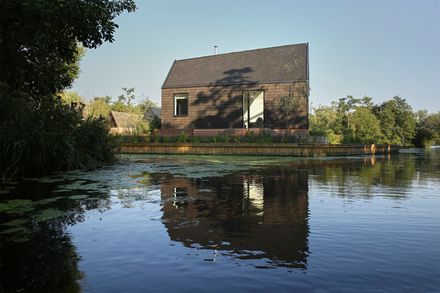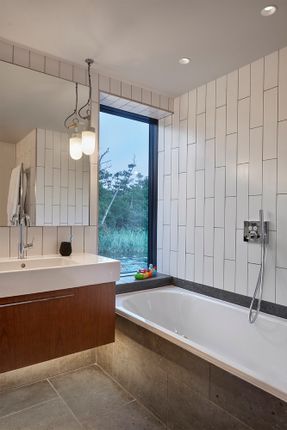ARCHITECTS
Platform 5 Architects
PHOTOGRAPHS
Alan Williams
MANUFACTURERS
Dornbracht, Hansgrohe, Allgood, Catalano, Davey Lighting, Delta Light, Duravit, EeStairs, GDStones, Krownlab, Marley Eternit, Maxlight, Solus Ceramics, Tom Dixon, Velfac, Acre Joinery, Atrium, Collingwood, Gripdeck, John Cullen Lighting, Newnham Structures, Panks, Westfire
FLOOD RISK ASSESSMENT
Evans River and Coastal
QUANTITY SURVEYOR
Richard Utting Associates
ECOLOGIST
Wild Frontier Ecology
ARCHITECTURAL AND INTERNAL METALWORK
K Rackham & Son Engineering
MAIN CONTRACTOR
Wroxham Builders
STRUCTURAL ENGINEER
Morph Structures
CLIENT
Claire & Patrick Michell
ARCHITECT IN CHARGE
Platform 5 Architects
PLANTING DESIGNER
Thomas Hoblyn Landscape and Garden Design
AV CONSULTANT
Buth Robinson
MECHANICAL & ELECTRICAL
M&E
PARTY WALL SURVEYOR
David Bullen
FORM OF CONTRACT
ICD WCD 2011
AREA
65 m²
ANNUAL CO₂ EMISSIONS
14.26kg/m²
CATEGORY
Houses
LOCATION
Norfolk, United Kingdom
YEAR
2016
Backwater, a new detached home designed by Platform 5 Architects replaces an outdated bungalow on a promontory in a secluded lagoon in the Norfolk broads, providing practice director, Patrick Michell with a family home.
Designing a new building for the plot provided the opportunity to enhance the setting by establishing a stylish counterpoint to more traditionally designed neighbouring houses while respecting the peaceful location.
A key objective was to create simple, contemporary living spaces at the centre of the house that is orientated to benefit from the views of the surroundings.
The house is arranged as three low rise bays, whose pitched roofs echo the working boat sheds typically found on the Broads. Externally the roofscape and side walls have been clad in blackened timber shingles to express the form as an abstract folded plane.
To the front and rear elevations, the timber shingles are left untreated to allow them to weather and create a warm textured appearance.
On the underside of the roof on the waterside elevation, timber boarding has been used to create a refined aesthetic that ties in with the internal joinery.
Each bay has a different volume and is orientated to address different views across the wetland landscape that surrounds the house.
The double-height vaulted living space faces onto carr woodland and a network of drainage dykes that teem with wildlife whilst the central bay offers panoramic views across the private lagoon. The bedroom wing has smaller framed views that pick out the reedbeds and jetty.
The façade to the entrance is a simple expression of the three pitched bays that have been subtly faceted around the landscaped ramp, with the main architectural drama reserved for the waterside elevation.
Timber shingle cladding contrasts the materiality of neighbouring houses and is beginning to weather back to provide a sympathetic presence against the surrounding trees and water.
The three bays of the house splay out in a way that the waterfront elevation becomes the most hierarchical point of the house.
Where the entrance facade is relatively modest, the house offers an outstanding counterpoint to its surroundings when viewed from the lagoon, providing the area with an exceptional example of contemporary architecture.
Glazing adorns much of this elevation to provide views over the surrounding landscape from throughout the house.
Deep eaves emphasise the house’s bold silhouette and provide sheltered external living spaces that are useable across the seasons.
The covered external space makes reference to the verandas of the neighbouring Edwardian riverside chalets along the main river that were built as holiday homes with an emphasis on leisure and relaxation.
Externally, a layered timber landscape provides the house with usable external space while acting as a transition from water level up to the elevated ground floor.
The planting was chosen to thrive in semi-aquatic conditions, often using ornamental versions of native Norfolk Broads species to create a garden that is harmonious with its watery environs.
The west edge of the site is more heavily planted to reflect the wild vegetation on the other side of the drainage dykes whilst the east edge is given a timber quay heading to allow for the mooring of boats.
Inside, a simple broken plan arrangement allows for flexible living and accommodates family life by allowing different activities to take place simultaneously through the use of timber sliding doors.
The central bay contains a large kitchen and dining area and flows into the adjacent double-height living space that is separated by a steel-clad fireplace.
The house’s three bedrooms occupy the third bay and are split over two floors, connected by an impressive spiral staircase that rises from the entrance hallway.
Each space has a carefully designed layout with built-in furniture to set the scene for family life.
A considered material pallet is used throughout these spaces, where a range of colours and textures respond to each room’s programme and create a cosy but varying atmosphere.
Located on a peninsula, construction on site was not a simple task, however designing the house out of lightweight elements provided ease of transportation down a narrow access road in a transit van.
Gaining access close to the water’s edge was a challenge and as the site is liable to flooding, the ground floor of the home had to be elevated to accommodate changes in water levels.
As the house is built atop unstable materials, the house’s foundations were piled down 10m to the chalk rock layer. The piles support a grillage of galvanised steel ground beams elevated above the high watermark.
This limited the use of concrete and reduced the time on site required to form the substructure, allowing the early creation of a dry construction deck.
The house itself is timber-framed with a handful of steel beams to provide support around the large glazed openings.
The house has been designed with sustainability in mind and offers a far more energy-efficient building than the outdated bungalow that was previously on site.
An abundance of south-facing glazing allows for a limited reliance on artificial lighting, while the deep eaves negate overheating during the summer.
The insulation and vapour barrier lines are carefully maintained to achieve high levels of airtightness for the efficient use of the ventilation system with heat recovery.
While the home is built to be used primarily by Michell and his family, it has also been designed to be able to be leased out as a holiday rental, increasing the financial viability of the project and allowing guests to visit and enjoy the secluded location.
The house has therefore been designed to be considered as a prototype when others consider building holiday accommodation.
A versatile home away from home whereby the design allows you to escape into the natural surroundings.










































